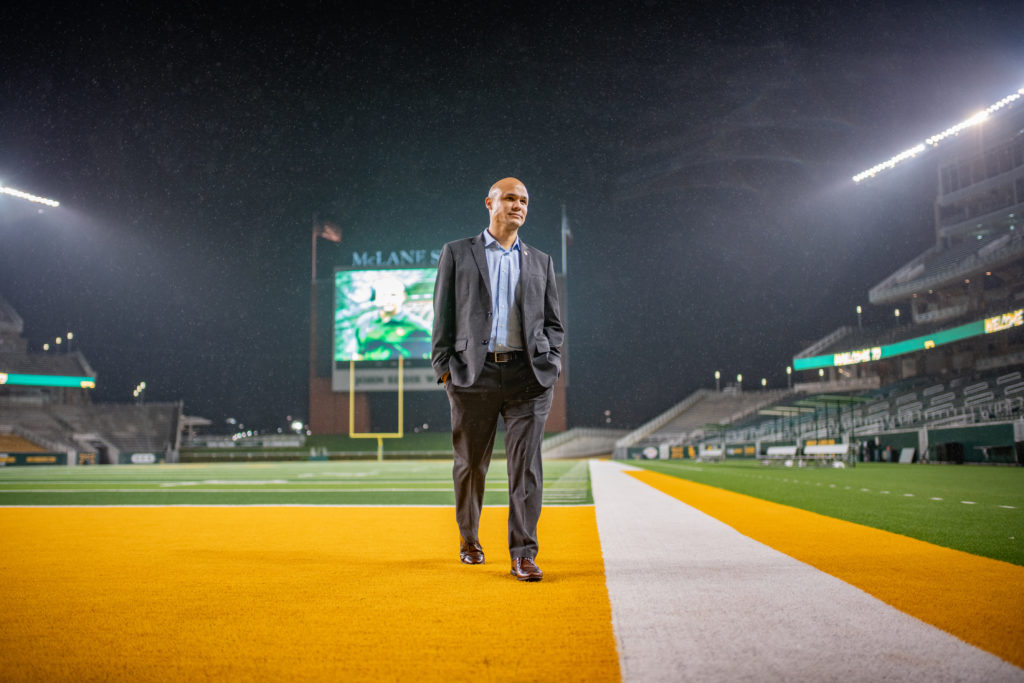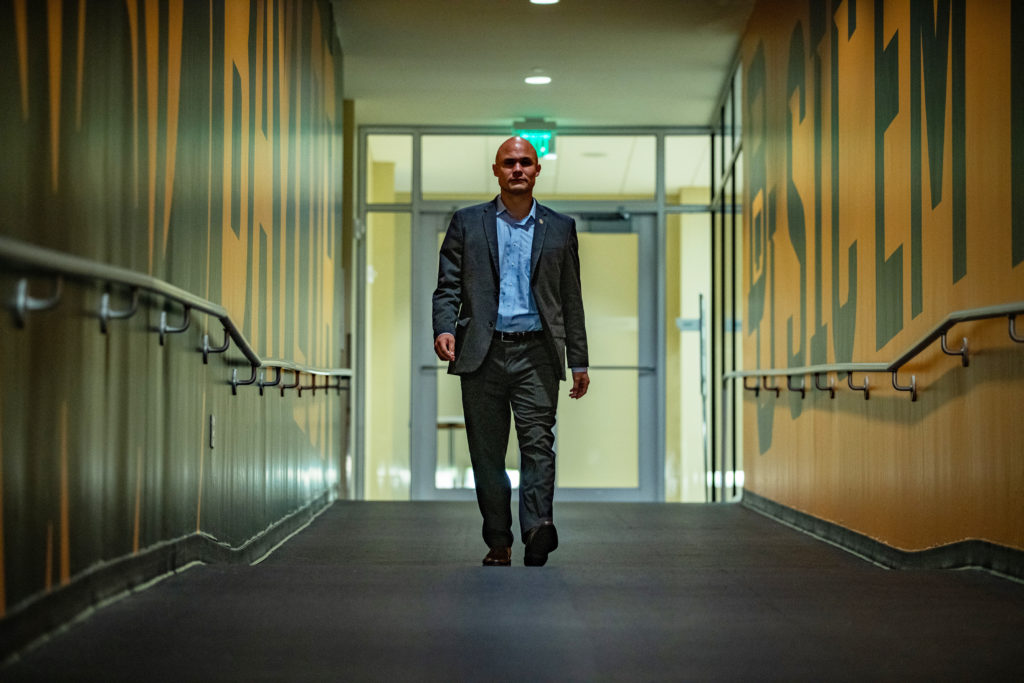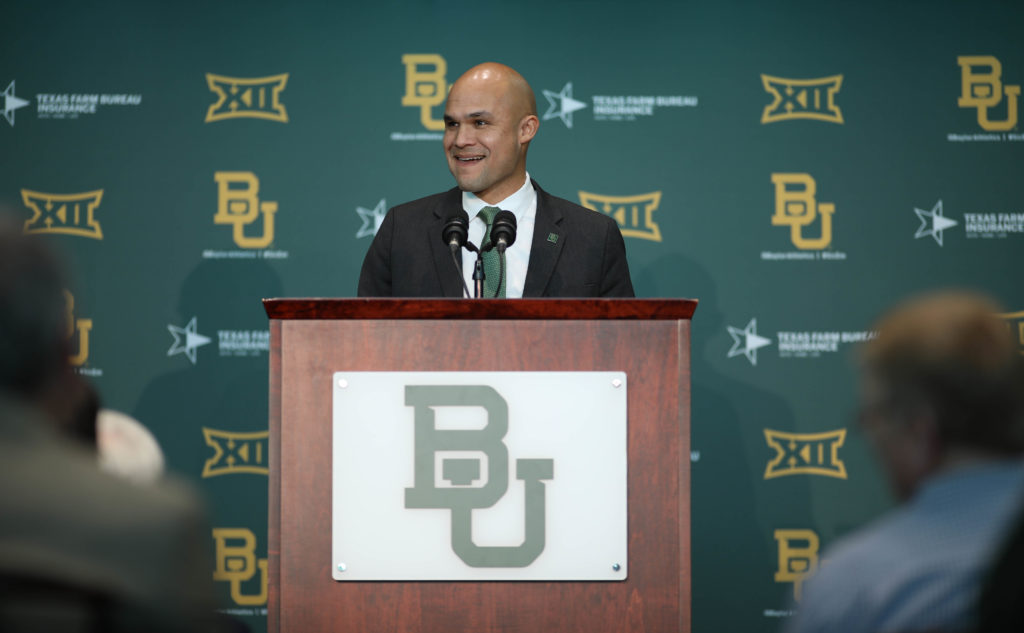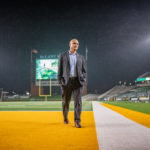New Baylor football head coach signals to bright achievements in coming season
Story by Matthew Soderberg
Photos by Mireya Ruiz and Jordan Burgess

“My parents would always say, ‘Something good’s about to happen,’ and I’ve always believed that,” Dave Aranda said.
Dave Aranda is the new head coach for the Baylor football team, and many believe he’s the next good thing to happen on campus.
Introductions
Matt Rhule, former Baylor head coach, left after the team’s first trip to a New Year’s Six Bowl game in the modern era. He turned around a program by instilling strong people and recruiting enthusiastic players.
When he left, there was a vacuum in the role model position for the players left behind, and Vice President and Director of Intercollegiate Athletics Mack Rhoades had to quickly pick up the pieces. He started making calls around the country for someone who fit his values and the university’s values. There were big shoes to fill.
Texas Tech head coach Matt Wells called Aranda a “deep thinker.” University of Texas head coach Tom Herman said he “brings tremendous experience to the Big 12.” ESPN college football analyst Booger McFarland called him the “best defensive mind in college football.” And Rhoades said he was the right choice.
“I just remember as that conversation continued, that the momentum continued to build,” Rhoades said. “And it continued to build as he was talking about his faith, and that his faith was at the core of the way he coached. And it continued to build when I understood that this was a man that was truly a leader of young men and had done it and had believed in it and didn’t just talk about it but lived that life. He was a man that was not only going to show our players in terms of playing the game, but he was going to make sure that they knew the game.”
Aranda came on campus with a wealth of knowledge and a depth of familiarity with people in the business. He was roommates with Herman at California Lutheran University, a graduate assistant at Texas Tech, linebackers’ coach under former Baylor football coach Art Briles at the University of Houston, defensive coordinator at Utah State University alongside Matt Wells and defensive coordinator at the University of Wisconsin.
Before arriving in Waco, Aranda coached under Les Miles at Louisiana State University and was retained by Ed Orgeron before the Tigers went on to defeat Clemson University in the national title game. After winning it all, Aranda felt he was called onto Baylor’s campus.
“When this job came open, I said, ‘This is in my heart. This is me. I feel like this is God talking to me.’ It just felt right,” Aranda said. “To have the opportunity to coach with your Christian faith out front was a big pull. … At Baylor, I can coach being myself.”
As the defensive coordinator of the reigning national champions, he walked onto Baylor University as an unproven head coach with a lot of ideas.

Growing a Culture
“I think the challenge is to identify the values, the beliefs, the strengths of the team, and integrate and blend those with your beliefs,” Aranda said. “One of my first discussions I had with the team the night I was hired was that I’m not looking to blow this thing up. I could see the hurt in their eyes when their coach left, and so it’s really important to me that we build off the success that they’ve had.”
Aranda was a philosophy major at California Lutheran, and he continued his education with a master’s in philosophy and religion. He spent his college days studying people, and his job now is not all that different.
“The key to being great at [coaching] is individualizing your teaching to meet your students’ needs and their level of understanding… Dave does a really good job of that,” Wells said.
Even with people describing the Californian as a scheme mastermind, the man is an avid people person.
“You could tell quickly he was going to be a great coach,” Herman said. “He had a maturity about him, and obviously a real love for the game, but a wealth of knowledge for a guy that young.”
He worked his way up the college football ladder with a combination of his intense aptitude for football and his passionate heart for the guys on his team. A coach he brought along with him, defensive line coach Dennis Johnson, described Aranda as a man worth sticking with.
“You trust the people that you get to follow,” Johnson said. “It means something when a guy takes a head job and thinks enough of you to bring you along with them.”
Once he got on campus, Aranda was focused on using one-on-one meetings with players and people surrounding the team to find out what kinds of things they valued and how he might connect with them. His coaching staff found players who fit alongside them.
“These guys, they’re up in your office,” Johnson said. “They’re around the building all day, so you’re talking to them constantly. You’re seeing them all the time, and the drills and everything, you get to know them so well. I feel like I’ve been here for a long time already, and it’s just been a month.”
Jorge Munoz, former LSU assistant and current Baylor wide receivers’ coach, echoed Johnson’s sentiment that it wouldn’t matter if the coaching staff had won a title or not.
“What Coach Rhule did here as far as the players he brought in, it’s a first-class bunch of players,” Munoz said. “These guys are motivated. These guys are dedicated … I think they’d be open to us no matter who we are.”

At Baylor, I can coach being myself.
Dave Aranda
Baylor Head Football coach
Instilling the Schematics
One part of coaching is the personality it takes to relate to the players. Another part is the philosophy behind the teaching. Combine those with a stellar system, and you’re on your way to a keeper.
“I’ve been with him for four years, and the amount of different game plans and the way to attack different things that I’ve seen through him since our time at LSU, you can’t find anywhere else,” Johnson said. “I’ve never seen somebody who is so well executed in college football.”
Aranda has produced a multitude of NFL prospects as a defensive coach in college football, including first round picks Devin White, Tre’Davious White and Jamal Adams. Some of that success can be attributed to his experience working alongside elite offensive minds like Herman and Wells.
“Growing up in the business, when you have a friend on the other side of the ball who’s as accomplished as Dave, it can be very beneficial just to be able to talk about the things that make it difficult on the other side of the ball,” Herman said. “We’d talk about what gave each other problems from an offensive and defensive standpoint, what was easy for you to diagnose or attack schematically, what we did not like to see. From a football standpoint, that was the biggest thing – being able to bounce ideas off each other.”
Aranda’s experience allows him to be a valuable asset to the offensive side of the ball as well. With a new offensive staff coming together and most of them never working together before, the former defensive coordinator has been the glue for his assistants.
“He knows what a good offense looks like,” Munoz said. “He knows what hurts really good defenses. So I think he’s been in our room about every single day … I think he’s going to be a good sounding board to go off for, ‘Hey, how do you beat this coverage? Or how do you protect against this type of pressure?’”
Aranda’s defense is predicated on versatility. He’s been known to run a 3-4 style defense, but it can run anywhere from a 2-4-5, to a 3-3-5, to bigger personnel when the situation calls for it. That type of scheme relies on players being able to perform different responsibilities on a play-by-play basis, and that style extended to the offense at LSU last season.
“The way that I coach, my thoughts right now, nothing’s original,” Munoz said. “It’s all stolen from some other philosophy from some other coach … And we’re still searching. We’re still looking for better ways and better answers … and that’s the challenge as a coach.”
A problem that might stint the team’s production at first: cornerback Raleigh Texada and Second Team All-Big 12 middle linebacker, Terrel Bernard, are the only returning players from last season’s high-powered defense. Still, Aranda is confident a fresh start with the players Rhule left behind will be successful.
“The expectations here are high because of the guys that we got back, because of the last couple years and the momentum that’s been built,” Aranda said. “I think they feel that the standard is something that they always wanted to be able to reach and really want to exceed.”

Becoming a Team
“Coach is not just a great coach, he’s not just a thoughtful, caring, wonderful person,” Rhoades said. “Coach Aranda is a transformational leader of young men, and he is the right man to lead our program going into the future.”
Aranda didn’t play football in college. He underwent several surgeries on his shoulder after an injury in high school, so he went straight to coaching while he was a student at California Lutheran. His biggest motivation for pursuing coaching was the feeling he had being a part of a team.
“Competition is striving to be the best that you can possibly be,” Aranda said. “I feel like leadership is influence, so I want to positively influence people and make them be the best that they can be. There’s such a great feeling when everyone can be who they are, so everyone’s coming from different places and everyone can be who they are and can be accepted and valued, so that you believe that you can do anything. You’ve got all these people that have got your back, and whatever is put in front of you, you can knock it down with the help of your brothers, your team.”
Aranda shares his passion and excitement for the possibilities of the upcoming season.
“To be on a team with good people that are in it for the right reasons, and to have the ability to play on big stages where we can showcase who we are and what we’re all about, it’s pretty cool,” Aranda said.

